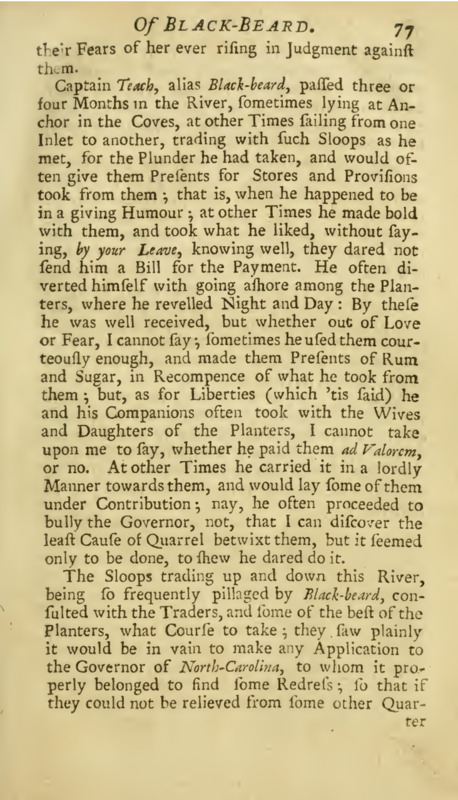Spotswood Intervenes: Virginia on the North Carolina Coast
Scholars have estimated that piratical activity on the North American coast and the surrounding waters of the Caribbean had reached its zenith in the years 1716-1720 estimating between “fifteen hundred and two thousand pirates operating in the Caribbean and North American waters”[1] This boom in piracy is attributed to the Spanish treasure fleet that shipwrecked during a hurricane off the coast of Florida.[2] While anti-piracy campaigns had been active for over two decades, there was little success in eliminating the havoc pirates wrought in port communities; one pirate in particular – Blackbeard.
Operating out of several coves and inlets off the coast of North Carolina, Blackbeard, formerly known as Edward Teach, plundered the southern coasts of North America from 1716-1718. Brought on by the mound of treasure sitting off the coast of Florida, Blackbeard plied his malicious trade choosing North Carolina as his haven.
Charles Johnson author of, A General History of the Robberies and Murders of the Most Notorious Pyrates, illustrates the fearsome reputation of Blackbeard that permeated the social structure of North Carolina. Speculation surrounding the success of Blackbeard relative to his fondness for North Carolina has not gone unnoticed. North Carolina Governor, Charles Eden, was rumored to have favored Blackbeard along with the plunder he received. According to Johnson, the residents of North Carolina were aware of the political corruption and “they saw plainly it would be in vain to make any application to the governor of North-Carolina, to whom it properly belonged to find some redress”.[3] In a desperate effort to rescue North Carolina from Blackbeard’s clutches, a group of merchants and traders reached out to Lt. Governor Spotswood – “therefore, with as much secrecy as possible, they sent a deputation to Virginia, to lay the affair before the governor of that colony, and to solicit an armed force from the men of war lying there, to take or destroy the Pyrate”.[4] This call for help suggests that Spotswood developed a reputation for his intolerance towards piracy in the first five years as governor, representative of his previous behavior regarding influence in the Bahamas and quick action concerning legislation.
Lt. Governor Spotswood, in a familiar fashion, answered the call for help thus severing his jurisdictional authority once again. Johnson illustrates the steps Spotswood took to extend his influence on North Carolina demonstrating his fervent determination to eradicate piracy wherever it may be; the implication being his rejection of political hierarchy in favor of social salvation. This power imbalance can be seen throughout the narrative thus far, but correspondence between Lt. Governor Spotswood and North Carolina Proprietor, Lord John Cartwright, implies his profound disinterest on appeasing Virginia elite. Further evidence indicating this troublesome relationship is located in the biography of Alexander Spotswood emphasizing “his unbridled contempt for those members of The House of Burgesses and governor’s Council who disagreed with his policies and practices”.[5]
Identifying the laden issues between Lt. Governor Spotswood and the Virginia elite propose further evaluation of the original argument to incorporate retaliation, rather than simply vengeance; moreover, Spotswood’s inherent reaction to piratical activity might not be as simple as his aforementioned duty to the subjects of His Majesty. Additionally, the methods that Spotswood has undertaken advancing the war on pirates thus far has been without approval or supervision from the Virginia elite or the Board of Trade. Considering this, the question of Spotswood’s role in anti-piracy campaigns and the lack of discussion, outside his role in removing Blackbeard, unravels a familiar narrative between colonial identity and imperial expansion. While Spotswood did not consider himself a Virginian until his last years in office, indicated by his scornful affiliations, it could be argued that Spotswood’s reaction towards piracy as shown reflects a crisis of identity demonstrated by his blantant disregard for both imperial and colonial authority.[6]
Emphasizing his immediate response to the residents of North Carolina, coupled with his ‘seek forgiveness later’ approach, it seems that Lt. Governor Spotswood would be the appropriate choice for effectively taking down a pirate as elusive as Blackbeard.
[1] David Cordingly, Under the Black Flag: The Romance and the Reality of Life Among Pirates (New York: Random House, 1995), 202.
[2] Peter Earle, The Pirate Wars (New York: St. Martin’s Press, 2003), 162.
[3] Charles Johnson, A General History of the Robberies and Murders of the Most Notorious Pyrates, (London: T. Warner, 1724).
[4] Johnson, A General History, 78.
[5] Randall Shrock, “Alexander Spotswood,” Encyclopedia Virginia, July 25, 2011. https://www.encyclopediavirginia.org/spotswood_alexander_1676-1740#start_entry (accessed Jul. 14, 2020).
[6] Shrock, “Alexander Spotswood,” Encyclopedia Virginia.
